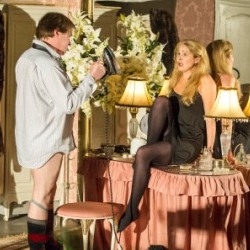Powder Her Face (ENO at Ambika P3)
The first opera by Thomas Adès energetically revived in a found space on Marylebone Road
English National Opera is off on its annual spring jaunt away from the Coliseum. As usual (and despite the middle word of their name) they are not using the occasion to venture outside the capital; but on the other hand they’ve honoured the first word by presenting a work by a living English composer, their first such in many years, with a second to come next month in the shape of Julian Anderson’s The Thebans.

© Richard Hubert Smith
Powder Her Face, loosely based by librettist Philip Hensher and composer Thomas Adès on the scandalous life of Margaret, Duchess of Argyll, was last seen at the Royal Opera House’s Linbury Studio in Carlos Wagner’s vertiginous production. That classy creation was a hard act for opera tyro Joe Hill-Gibbons to follow, but he’s given it a heck of a go.
Audiences familiar with the young director’s work at the Young Vic will recognise his grungily immersive style. Entry to the Ambika P3 space at the University of Westminster (directly opposite Baker Street Station, so hard to miss) feels for all the world like a Punchdrunk journey, but that soon gives way to a mocked-up court room – or is it a pathology lecture theatre? – where the doings of the Dirty Duchess are anatomised before us.
The plot swings back and forth through the twentieth century as the lady in question, sung with tremendous authority and hauteur by Amanda Roocroft, ekes out a sad existence in lonely hotel rooms while two employees, alternately sneering and servile in the vibrant performances of Claire Eggington and Alexander Sprague, amuse themselves at her expense. They and the Hotel Manager (Alan Ewing, magisterial in a role he has made his own) also play every other character.
Where this production gains over previous incarnations of Powder Her Face is in its compassionate even-handedness towards towards the grande dame at its heart. She is a pathetic soul, trapped in the straitjacket of her own snobbishness and doomed to be branded a trollop thanks to a messy divorce that hinged on Polaroid evidence of her engagement in oral sex.
The chamber-sized orchestrations by Adès (who was 24 when he wrote Powder Her Face in 1995) are brash and strident, as in-yer-face as the Duchess’s peccadillo. From foxtrots that recall Peter Maxwell Davies to dramatic, Shostakovich-like evocations, the music rarely holds back.
This is where the choice of venue comes into question. Untamed by an enclosed pit, Timothy Redmond‘s excellent ENO players share the floor with the singers while audience-members, serried in high-rise ranks of traverse seating, gaze down. Small wonder that all four singers have trouble projecting Hensher’s lustrous text, which is presented without surtitles and makes impossible demands of anyone unfamiliar with the opera. When Alan Ewing’s Judge sings from the same level as the spectators every word is clear; for the rest it’s pot luck, with communication depending on where the singers are facing and how loudly the instruments are playing.
The production offers a gallimaufry of tricks, some original, others – like the Katie Mitchell-inspired live projection table – over-familiar. The performing space as designed by Ultz becomes strewn with the detritus of a wasted life, cruelly illuminated by travelling arc lights and peopled by ghostly scene-shifters so low of class that the Duchess cannot even see them.












